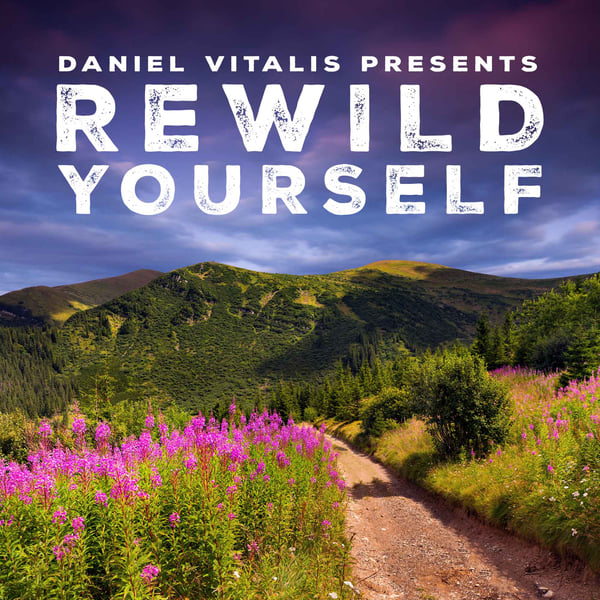The Ancestral Biology of Birth - Dr. Sarah Buckley #153
ReWild Yourself
Daniel Vitalis
4.8 • 924 Ratings
🗓️ 19 July 2017
⏱️ 99 minutes
🧾️ Download transcript
Summary
How can you create conditions that are private, safe and unobserved for yourself during childbirth? This question is a core message behind the work of Dr. Sarah Buckley — author of the best selling book Gentle Birth, Gentle Mothering and mother of four home-born children. Dr. Buckley is a New-Zealand-trained GP/family physician with qualifications in GP-obstetrics and family planning and currently combines full-time motherhood with her work as a writer on pregnancy, birth, and parenting.
Women were biologically designed to give birth in the wild, and oftentimes, the conventional maternity care system does not effectively support the ancestral and biological needs of a woman during childbirth. Dr. Buckley spent seven years researching and synthesizing the scientific evidence on the hormonal physiology of childbearing. She found that the science confirms the innate wisdom of a laboring woman — following your intuition can allow your hormones to guide you on the pathway to a healthy, gentle birth.
In this episode, we unpack how women can tune into their innate birthing wisdom as Dr. Buckley guides us through the hormonal physiology from pregnancy all the way through to the first days spent with their newborn baby. We discuss preparing for labor, hormonal gaps, choosing a healthcare provider, breastfeeding, bed sharing and so much more. Enjoy!
EPISODE BREAKDOWN:
- Show introduction:
- Why Daniel's excited about Yaupon tea
- Chewstick update
- Hunt + gather updates: blueberries, mackerel fishing, clamming & upcoming Florida freediving trip
- Q&A: Daniel's opinion on sustainably-harvested coffee
- Q&A: Call to listeners for child-friendly resources with a "rewilding mindset"
- Introducing Dr. Sarah Buckley
- Sarah’s background
- Modern medical research validating traditional birthing wisdom
- Designed to give birth in the wild
- Institutionalizing the birthing process
- Pre-labor physiological preparations
- Defining a hormonal gap
- Setting yourself for the least amount of hormonal gap
- Listening to your intuition when choosing a healthcare provider
- What to do when hormonal gaps happen during birth
- Is there an appropriate length of time to breastfeed?
- Thoughts on bed sharing — a baby’s ancestral hardwiring
- Sarah’s mission statement
- What most excites Sarah in the field of birth care
- Sarah’s prognosis for the future of the human species
Transcript
Click on a timestamp to play from that location
| 0:00.0 | You're listening to the rewild yourself podcastakens. Your instincts. |
| 0:14.0 | Awakens. |
| 0:16.0 | Awakens. Awakens. |
| 0:17.0 | You're it instincts. |
| 0:18.0 | Awakens. You're it instincts. Welcome back to the Rewild Yourself Podcast. I'm your host Daniel Vitalis and |
| 0:29.3 | this show is brought to you by Sir Thrival.com. We are so proud to have just launched our newest product Yopon T. |
| 0:37.0 | I feel that this plant really has the capability of sort of revolutionizing how people in the United States and Canada use caffeine. |
| 0:47.8 | And of course we have been importing our coal and not from Africa. |
| 0:51.8 | We've been importing our coffee from various equatorial places |
| 0:55.3 | around the world causing a tremendous amount of deforestation in the process. We've |
| 0:59.2 | been importing our Yurbamante. We've been importing our Waiusa, we've been importing our Guarana, all our caffeine has been imported from around |
| 1:08.8 | the world and meanwhile just sort of flying below the radar. There has been a prolific plant throughout |
| 1:15.7 | the southern United States known as Yopon and it has been here all along and we |
| 1:21.2 | were drinking it before we started importing all of these other plants |
| 1:27.1 | from outside. |
| 1:28.1 | In fact, one of the main plants, one of the first ones we started importing was Kaimelius Sinensis, the tea plant from China. |
| 1:34.2 | And it does look like the importation of that plant |
| 1:38.1 | and the sort of forgetting of Yopon are very connected. |
| 1:41.9 | In fact, it might have been the Ceylon Tea |
| 1:43.4 | company that wanted people to forget about Yopon and start using imported tea |
| 1:48.5 | from China and there might even have been a smear campaign against Yopon. Whatever |
| 1:51.7 | happened, it was forgotten about. Of course, |
... |
Please login to see the full transcript.
Disclaimer: The podcast and artwork embedded on this page are from Daniel Vitalis, and are the property of its owner and not affiliated with or endorsed by Tapesearch.
Generated transcripts are the property of Daniel Vitalis and are distributed freely under the Fair Use doctrine. Transcripts generated by Tapesearch are not guaranteed to be accurate.
Copyright © Tapesearch 2025.

